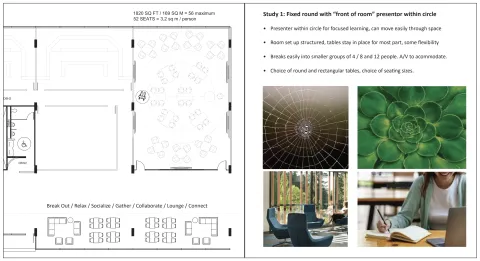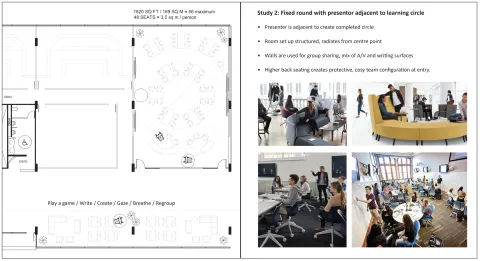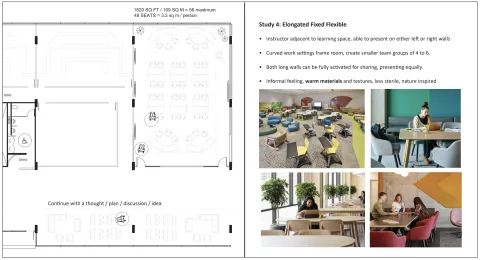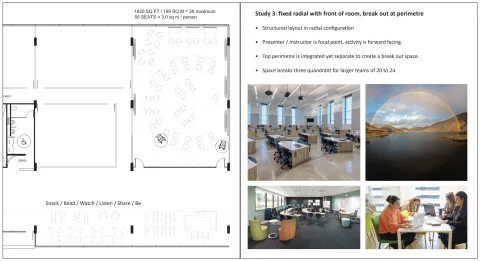Instructional Spaces
LEE (Learning Environment Evaluation)
Learning is impacted by the physical space in which it occurs. The Teaching Centre team has been privileged to collaborate with stakeholders and experts across the University of Lethbridge to engage in research and development of enhanced learning environments. The LEE project began in 2011 and, as a product of this work, numerous spaces across our institution have been redesigned. Our team continues to collaborate with colleagues from across the university, currently prioritizing the Classroom of the Future project. Informed by research and consultation, the current draft designs are ready for feedback. We invite you to peruse the project and offer your thoughts.
Classroom of the Future
Summary of research (2024)
- We reviewed over 200 articles.
- These highlighted the importance of classroom design features such as flexibility, technology, lighting, sightlines, colour, seating, space, windows, doors, ventilation and air quality, heat, nature/plants, and acoustic and noise.
- Research suggests increased student engagement and academic scores when physical design supports pedagogical style.
- New trends in the literature include increased research on classroom technology (hybrid classes/smart classes), EDI (tech support, ALC, decolonial, well-being-focused), and the impact of active learning classrooms on student learning.
- We have consulted with groups across campus to gather the perspectives of Indigenous groups, academic staff, and university staff & stakeholders.
Challenges & Considerations
Evolving capacity needs for classroom sizes
- Currently, the highest demand is for active learning classrooms with a capacity for 60 – 80 students.
- Past research has shown that the limit for active learning classes is 60 students.
Accommodation of diverse student needs
- The increase in complex student needs can be addressed in the design of this learning environment.
- Additional consultation with ALC may be needed to ensure we can address some of the demand that they are experiencing.
Consultation with Indigenous perspectives
- This creates a new layer in the design process, moving forward with efforts to respond to the TRC across our institution.
Pedagogy is a priority
- Research emphasizes that the classroom of the future must embrace active learning pedagogy.
- There may be some resistance from educators who are uncomfortable moving away from traditional pedagogy and classroom spaces.
Destination Phase II
- This opportunity can showcase an innovative space as a consideration for the design of upcoming classroom spaces.
The Instructional Spaces Committee has collaborated and consulted with many across the University of Lethbridge during 2024. Susan Jefferson, informed by her expertise, creativity, and genuine collaborative efforts, has created the draft classroom designs for our consideration.
SCALE-UP
The acronym SCALE-UP originally stood for Student Centered Activities for Large Enrollment University Physics, followed by Student Centered Activities for Large Enrollment Undergraduate Programs, and is now often used as Student Centered Active Learning Environment with Upside Down Pedagogies. What remained common to the name is indicative of the goals that SCALE-UP seeks to achieve: a student-centered and active learning environment.
Active Learning
In active learning, the responsibility for learning lies with the learner, not with the teacher. Active learning can be defined as any or all of the below, according to Michael (2006):
- the process of having students engage in some activity that forces them to reflect upon ideas and how they are using those ideas;
- requiring students to regularly assess their degree of understanding and skill at handling concepts or problems;
- the attainment of knowledge by participating and contributing;
- the process of keeping students mentally, and often physically, active in their learning through activities that involve them in gathering information, thinking, and problem-solving.
Project Classrooms
The Learning Environment Evaluation (LEE) project is constantly researching ways to improve classroom spaces on campus. Based on the data we have collected, we were able to turn a few rooms into LEE Project Classrooms to pilot new equipment, furniture, room layout, and other physical aspects of the rooms.
LEE Data (2012-2016)
Data reports and data highlights from our research.




